A brief sketch of the Life of Hasan Unutmuş
By Thomas Cosmades

From Sailing the Seas to Seeking the Strays
A brief sketch of the Life of Hasan Unutmuş
Beloved servant of Christ
Now with
his Lord in Glory, which is ‘Far Better’
In
August of 1968, Lila and I with our two girls, Debbie and Heather, moved to
Upon
our arrival we came face to face with an undeveloped ministry, calling for
social involvement as well. There
was no Turkish literature other than the Scriptures.
One of the first tasks was to produce literature for the Turkish
people. I immediately started writing, not having much skill in this area.
We even produced a calendar with tear-off messages for each day. In due
course, the Lord gave me the privilege of beginning the modern translation
of the Turkish New Testament. We
were not going to wait until the whole New Testament was completed before
printing Scripture portions. Realizing
the immediate need of the Turkish ‘guest workers’ (Gastarbeiter) we
decided to print the Gospel of John in bilingual form – Turkish and
German. This found good
reception. We also started producing cassettes and had daily short-wave
radio programs, reaching to every part of
Several
seamen who received this Gospel did write and we supplied them with more
literature. “Some went down to the
sea in ships, doing business on the great waters; they saw the deeds of the
LORD, his wondrous works in the deep” (Psalm 107:23, 24). One
day, a very encouraging letter came from a Turk who introduced himself as
Hasan Unutmuş. The story he
told stays in my mind until this day. The
Israeli ship on which he was a cook came into the
In
this desolate mood Hasan got off the ship to make his way to the nearest
barroom. But his steps stopped short when he was encountered by a man of
slight stature, who was out at the dock seeking to evangelize seamen coming
in from all parts of the world. In
his bag was literature in many languages which he was offering to the
sailors. He immediately asked
Hasan, “What nationality are you?” When
he replied “Turk”, the fellow told him to wait a minute while he
proceeded to find the bi-lingual Turkish-English Gospel of John.
Hasan was amazed when this little book came into his hands free of
charge. (Ed. For the benefit of the reader, this valuable portion of the
Gospel is an ongoing evangelistic ministry. We just produced a new edition,
following previous printings: ‘Su,
Ekmek, Yaşam’ {Water, Bread, Life}. Anyone interested in obtaining it for his/her contacts with Turks can
write to the address given here.) He read a few lines, then instead of going
to find a bar, his footsteps took him back to the ship.
He immediately became engrossed in the message, eagerly reading the
Gospel from start to finish. He
was struck with amazement when he read this verse: “Greater
love has no man than this, that a man lay down his life for his friends”
(John
One
day we received a brief letter in
Time
elapsed. Another letter reached
us, this time a very sad one. He
wrote, “I am Hasan Unutmuş, who requested a Turkish New Testament
some time back. I wish to thank
you for sending it and the other material.
However, the sequel of my request turned out to be very sour.
Upon our arrival in
The
captain with deep exasperation threw the books at Hasan with a warning:
“Mark my word, there will be consequences from this!” “Save
me, O God! For the waters have
come up to my neck. I sink in
deep mire, where there is no foothold; I have come into deep waters, and the
flood sweeps over me… But as for me, my prayer is to you, O LORD.
At an acceptable time, O God, in the abundance of your steadfast love
answer me. With your faithful
help rescue me from sinking in the mire; let me be delivered from my
enemies…” (Psalm 69:1, 2, 13). With
deep satisfaction Hasan received the New Testament and started reading it.
It is not quite clear if he came to a decision for Christ at this
reading, or whether he later came to the realization of Christ as Savior of
his soul. “Your
way was through the sea, your path through the great waters; yet your
footprints were unseen” (Psalm 77:19).
Quite
some time elapsed. We didn’t
hear anything from Hasan. I
could add that we may have even forgotten him, since there were so many who
were writing in for Scriptures at that time.
One day a letter came from
Naturally
this matter created deep distress in our hearts.
Immediately we put him in touch with believers in
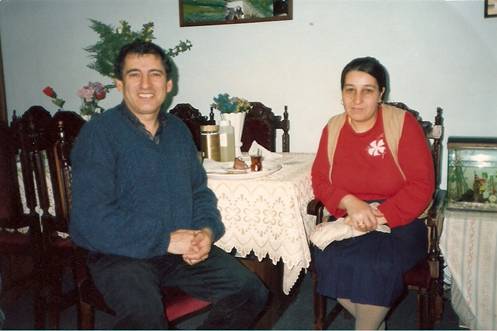
Hasan and Fatma
With
Hasan jobless, the family was living in poverty at this time.
The future was uncertain. Food,
heating and other basic needs pressed on him. Hasan desperately needed a
job. At the Berlin Congress of
World Evangelism in 1966 I had met Torrey Mosvold, a Norwegian Christian
ship owner. He had told me then,
“If you need to place someone in one of my ships, I will consider him.”
Since Hasan had been working on the high seas, I immediately made the
connection and wrote a letter to Mr. Mosvold.
He quickly responded by offering Hasan a job as cook on one of his
tankers, with very high pay. So
Hasan went to work with this shipping company.
“I believe that I shall see the goodness of the LORD in the land of
the living! Wait for the LORD;
be strong, and let your heart take courage; yes, wait for the LORD (Psalm
27:13, 14)! The ship was
moving very fast from port to port, at a time when there was a high demand
for oil. It was not possible for
Hasan to have any time at the ports to look for Christian fellowship. He
later told me that there was a Christian Portuguese sailor with whom he
regularly studied the Bible, each in his own language. But
in spite of a number of advantages Hasan resigned from the ship prematurely,
having accumulated considerable money. It
must have been at this time that he bought a house in Küçükyalı.
At last the time came for Hasan to be baptized.
He was baptized in the presence of many believers at Kilyos on the
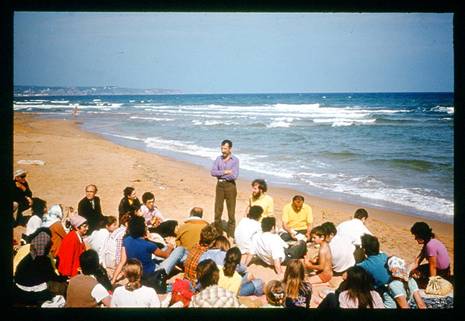
He
didn’t want to work any longer on the high seas, as he desired to be near
his wife and two children. He
looked into possibilities of starting some kind of work.
Temptation was on the way. In
his neighborhood he noticed a tea house was for sale.
He thought it would be nice to run that business so near to his home,
little realizing that the hours he would be putting in there would be much
longer than his working hours on the ship. Men sat around nondescript tables
wiling away their time playing cards and backgammon while smoking and
drinking tea. They wouldn’t leave the tea house until
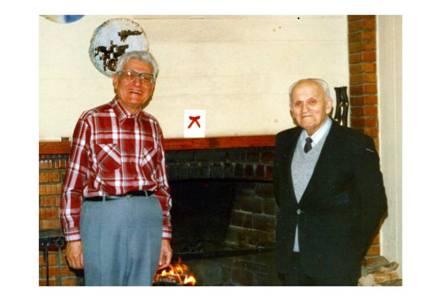
Thomas & pastor Deliyannides
At
this time, the Lord prepared for a radical change in Hasan’s direction.
The pastor of the
With
the suggestion of Reverend Deliyannides, he opened a grocery shop near his
home where he also sold Scriptures. When
fanatics from the neighborhood saw what he was doing, they became very
agitated. The grocery shop work
was not very profitable, but it was a place opened for a purpose. Hasan
started receiving threats, but he didn’t pay much attention to them at
first. One day while he standing
behind the counter in his shop, a drive-by shooting took place.
The car was traveling at high speed, and the bullet just missed
Hasan’s head. “…you
will not fear the arrow that flies by day…it will not come near you”
(Psalm 91:5b, 7c). Hasan testified to the goodness of the Lord in
protecting him at that very dangerous moment.
All his family and friends thanked the Lord for sparing his life.
No one could imagine that the same aggression would be repeated.
A while later another car targeted the shop in the same way. After
this attack, the decision was made to terminate this ministry in Küçükyalı.
Hasan closed the shop.
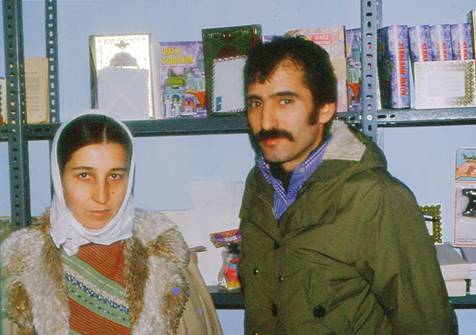
Hasan and Fatma
At
this time, the Turkish short-wave radio programs were generating much
response from all over Turkey. I
was responsible for the broadcasts, which were aired each morning and
evening, seven days a week. We
were sending literature from
When
Lila and I visited
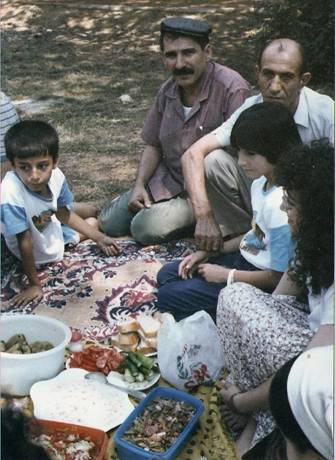
Hasan, Haydar and kids at picnic.
The
visits to radio listeners became very encouraging, but Satan was going to
attack. One day Hasan received a
cordial invitation to visit some radio listeners in Nazilli, so he
immediately took off by bus to visit them. One evening the inquirer invited
some friends to his home. They gathered in his house and listened to the
message of salvation from Hasan. But unbeknown to the rest there was one
fanatic who appeared under the guise of a seeker, but in reality had come to
stir up trouble.
The
following morning police rang the doorbell of Hasan’s hosts and asked him
to come to the police station. A
very harsh inquiry ensued: Who was he? Why
did he visit that house? Why was
he doing that work? What was his
goal? Etc., etc…. The severe
inquiry gave way to manhandling and went on to excruciating torture: “They
surround me like a flood all day long; they close in upon me together”
(Psalm 88:17). His
body became the target of the police’s brutality.
The climax came when he was tied to a piece of wood, typifying the
cross, and the police forced torrents of cold water on his body, causing him
to tremble violently. Finally, they told him to hold out his hands.
They placed tacks in the palms of both hands and demanded, “Now,
swallow these tacks!” At that
moment, he cried to them for mercy, saying he couldn’t bring himself to do
it. He was thinking of his family and that they needed him.
The tactic of the police was to compel him to take that radical step
which would cause his death and then they would issue a statement that he
had committed suicide.
Torture
was the ordinary routine utilized by police in
A
short time had elapsed when a group of seekers in Bingöl in the eastern
region of

Hasan and
The
folks in Bingöl wanted him to visit them again so this time he took Jim and
David with him. After meeting with them just once, Hasan was apprehended by
the local police. The police
ordered the two foreigners to leave the city immediately.
Hasan, left alone, was then subjected to unbearable torture.
They said that he had trespassed the laws of the country by visiting
these people and teaching them his religion.
They kept hammering a question at him while beating him: “You, a
Turk; why did you choose Christianity and become its propagandist?”
They threw him to the floor and several policemen started violently
kicking him around. There was no
end to their frenzy. “I am poured
out like water, and all my bones are out of joint; my heart is like wax, it
is melted within my breast; my strength is dried up like a potsherd, and my
tongue cleaves to my jaws; you lay me in the dust of death” (Psalm 22:14,
15). Finally they saw that
his very life was endangered. Just
as in the previous horrendous ordeal, Hasan was unceremoniously dispatched
without any judicial case brought against him.
They put him in a police car, drove him out of the city and dumped
him on the side of the road in a remote place.
No one was around. After
waiting a while, a passing car picked him up and brought him to the nearest
town from where he caught a bus to his home in
Those
were disturbing times when Turkish police had become infamous for their
notorious practice of torture. A young policeman, who loathed their cruel
methods and left their ranks, later related what he had learned during his
training: “When we were drafted, we were told that in this profession we
have to leave our conscience behind.” “Speak
up for those who cannot speak for themselves, for the rights of all who are
destitute” (Proverbs 31:8). It
happened that Lila and I were spending the summer at my brother-in-law’s
home in Heybeliada on the
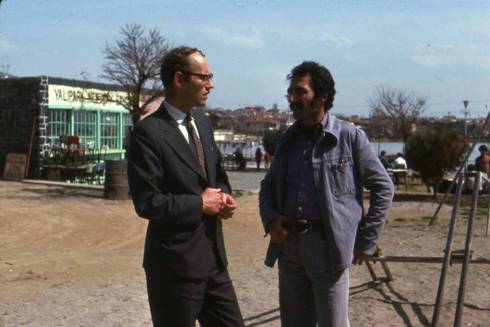
Hasan and David Winch
After
the gruesome episodes he had suffered for the sake of Christ, Hasan no
longer had the vitality to travel around and visit contacts in Anatolia. At
this time, David and Anne Winch, who had already moved to
Following
the period of his training, Hasan returned to
Erjan,
even though he grew up in a home where Jesus Christ was known and confessed,
never took an interest in the Christian faith.
From his early youth, he was very opstreperous. “...a man’s foes will be those of his own household” (Matthew
10:36). The believers in
England at one point bought a car for Hasan’s ministry.
One day Erjan took the car and caused a serious accident.
The car was totalled and for some days he was hanging between life
and death. He lost his spleen, but amazingly, recovered from the ordeal.
How we wish he had taken this deliverance as a merciful act of the
loving God whom his father served. Conversely,
he went on mingling with the wrong crowd.
In the meantime he married
and acquired a child. Finally, this depressing episode was concluded with
his being murdered at thirty years of age.
This part of the story is a very sad chapter which brought untold
grief to both Hasan and Fatma. “...O
my son Absalom, my son, my son Absalom!
Would I had died instead of you, O Absalom, my son, my son!” (II
Samuel 18:33b). Any
Christian parent can imagine how desperately sorrowful Hasan and his wife
were to bury their own son as a lost boy.
In
the meantime, a young Turk who was in Germany wrote to Gülsabah that he was
interested in marrying her. Many
thought they would make a good match since Yusuf (the young man) had a
testimony of his conversion. In
due time they were married at the International Church in Istanbul, where I
gave the message at their wedding. Gülsabah
moved to Germany, with all of us anticipating that she and Yusuf would
become an effective Turkish Christian couple.
Alas, once again Satan contrived another vicious scheme.
After some time, with a little son having been born to them, Yusuf
showed signs of mental disturbance. This little family began shaking.
Eventually, Yusuf took off and the marriage disintegrated.
All
these sad episodes go to show how shrewd and determined the enemy is.
Shortly after the time that Hasan was first exposed to the Gospel in
New York harbor, one trouble followed another, starting with his encounter
with the fanatic captain of his ship in Mombasa. “...all
this has come upon me...I loathe my life; I will give free utterance to my
complaint; I will speak in the bitterness of my soul.
I will say to God, Do not condemn me; let me know why you contend
against me” (Genesis 42:36c; Job 10:1, 2). These sad developments can
be a case study in the conversion of Turks, particularly of those who choose
to minister the Gospel. Hasan’s
numerous problems came upon him and his wife like a flood.
He lost ground in the faith. Knowing
the painful chain of events, one can empathize with the sad climax of our
dear brother’s life. For a
while, he was suffering depression which was also extremely difficult for
Fatma. Finally, Hasan was
diagnosed as having cancer. Fatma
faithfully took care of him during his last days on earth, never wavering in
her faith. She kept attending
the women’s Bible studies in Buca and attached herself to the newly-formed
Baptist Church in that area which was established through the endeavors of
Pastor Mesut Cevik with Hasan.
The
acquisition of this church was nothing short of a miracle.
Originally it was an impressive Anglican Church with a wide yard and
a historic cemetary on the grounds. When
the Anglicans left the place, the Turkish government took it over and
removed the cross from the top
of the edifice. They converted
it to a Turkish cultural center. Mesut
and Hasan prayed that this church would be re-acquired for the glory of
Christ. The endeavor was long
and arduous. Finally through divine intervention the Turks turned over the
entire property to Mesut, who became the recognized pastor of the
newly-formed Baptist Church of Buca
Hasan’s
health gradually deteriorated and he went to meet his Lord on July 19, 2006.
He had not known anything about Christ in his early life.
But appeciating the value of God’s grace, he developed into a very
faithful servant of Jesus Christ, even bearing the marks of Christ in his
body. His widow Fatma is a most faithful follower of Jesus Christ.
She has the realıty of her Lord in her life, which shows in her
whole mien. . It should be mentioned that when Fatma came to Christ years
before in Küçükyalı she was illiterate. When she believed in Christ,
she was eager to read the Bible, so the missionaries’ wives opened the
world of literacy to her. Fatma became very active in the Kadiköy church at
the time it was functioning there. She served tea after church every week
and also graciously hosted meetings in their home.
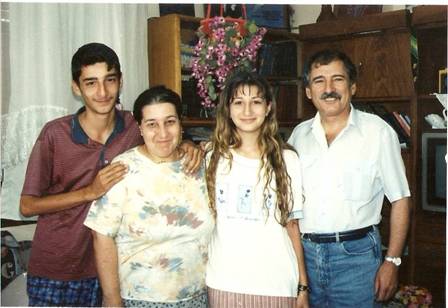
Hasan, Fatma, Esra and Jem
As
for the remaining Unutmuş children, the younger daughter Esra finished
university in Turkey, keeping a strong testimony for Jesus Christ during the
years of her studies. She is now
married to Aaron Miller from Oregon, U.S.A., and together they work among
university students in Istanbul. The
younger boy Jem is a follower of Christ.
He has finished his military service and is working with the Bible
Correspondance Course in Turkey while seeking other avenues of serving the
Lord. It is not impossible for
the Lord of the Harvest to lay his hand on him to lead him study God’s
word and carry on the work left by his father. The Lord will make known the
way he should take. Gülsabah, presently living in Germany with her two
sons, is struggling with life and in need of prayer.
The Lord did not promise a flowery life to those who put their trust in him,
rather that his followers would suffer even as He suffered.
Hasan’s life is a vivid example of what a Turkish Christian can
anticipate when he turns to Jesus Christ.
In all Hasan’s tribulations and testings His Lord was faithful to
him. Finally he was released
from this world’s sufferings and taken into His glorious presence.
Hasan’s
remains were buried in a large Muslim cemetary in Istanbul with about one
hundred fifty relatives and friends attending the graveside service. Several
Christians gave testimony to Hasan’s life and faithfulness.
Others read from Psalm 23
and I Corinthians 15 and prayed.
When everything was concluded,
three young men came up and asked, “What is the book you were
reading from? We have never heard anything like that before.”
We directed them to the Bible Society shop in Istanbul where they
could purchase a Bible.
Hasan’s love for the Scriptures was honored even in his death.
“As
for me, I shall behold thy face in righteousness; when I awake, I shall be
satisfied with beholding thy likeness (Psalm 17:15).
Thomas Cosmades – 2008
God has not promised skies always blue
Flower-strewn pathways all our lives through.
God has not promised peace without pain
Joy without sorrow, sun without rain.
But God has promised strength for the day
Rest for the labor, light on our way
Grace for the trials, help from above
Unfailing kindness, undying love.
~~Annie Johnson Flint (1919)
~~Alfred Smith (music)